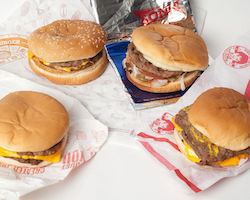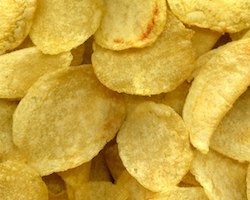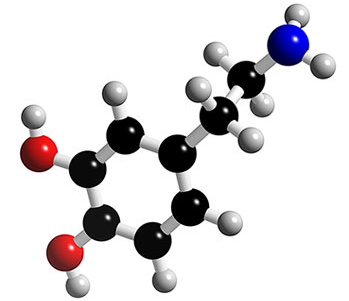show/hide words to know
Dopamine: a chemical messenger that acts in the brain to affect how we perceive reward and pleasure, and increases motivation to seek these kind of experiences....more
Food Addiction

Hi-calorie foods are now readily available to most humans. Mixed with our cravings for sugar, fat, and salt, this can cause us to eat many more calories than we need. Image by TheDapperDan.
For humans, the nutritional environment we face now is very different than that which our ancestors faced. Instead of hunting and gathering, we go to grocery stores and restaurants stocked with every food imaginable. With such ready access to caloric-rich food, our desire for the pleasurable sensations of taste can get us into trouble. Obesity and diabetes are now concerns facing the human population. If access to caloric-rich food wasn’t enough, there is now an entire commercial research industry studying taste in an effort to produce foods that we simply cannot get enough of.
Have you ever gotten to the bottom of a bag or potato chips or cookies, and joked that they were “addictive?” That might not actually be the wrong word choice. Food addiction is potentially a real disease that has the same effects on the brain's reward center as hard drugs. Eating high fat or high sugar foods ultimately results in the release of the neuorotransmitter dopamine in the brain.

Some foods are addictive because they reward pleasure centers of the brain, the same way some addictive drugs do. Image by Rainer_Zenz.
Dopamine activates receptors in the reward center of the brain, enhancing the pleasurable experience of consuming a high caloric meal. With too much dopamine, the reward center is overstimulated and responds by producing less dopamine receptors. This means that in order to produce the same pleasurable response as before, with fewer receptors, more dopamine must be released to activate the remaining receptors. This produces a feedback loop.
If one bag of potato chips originally produced, say, a level 5 pleasurable response, eating more and more chips regularly might cause a drop to a level 3 pleasurable response. To get back to a level 5 pleasurable response, yet more chips would need to be eaten. This is the same neural mechanism that underlies drug and alcohol addiction.
View Citation
Bibliographic details:
- Article: Food Addiction
- Author(s): Shelley Valle
- Publisher: Arizona State University School of Life Sciences Ask A Biologist
- Site name: ASU - Ask A Biologist
- Date published: October 6, 2017
- Date accessed: May 8, 2024
- Link: https://askabiologist.asu.edu/food-addiction
APA Style
Shelley Valle. (2017, October 06). Food Addiction. ASU - Ask A Biologist. Retrieved May 8, 2024 from https://askabiologist.asu.edu/food-addiction
Chicago Manual of Style
Shelley Valle. "Food Addiction". ASU - Ask A Biologist. 06 October, 2017. https://askabiologist.asu.edu/food-addiction
Shelley Valle. "Food Addiction". ASU - Ask A Biologist. 06 Oct 2017. ASU - Ask A Biologist, Web. 8 May 2024. https://askabiologist.asu.edu/food-addiction
MLA 2017 Style

Fat and sugar intake causes the brain to release this molecule, dopamine. Dopamine activates part of the pleasure center of the brain, making us want to eat more fat and sugar for more pleasurable feelings.
Be Part of
Ask A Biologist
By volunteering, or simply sending us feedback on the site. Scientists, teachers, writers, illustrators, and translators are all important to the program. If you are interested in helping with the website we have a Volunteers page to get the process started.







